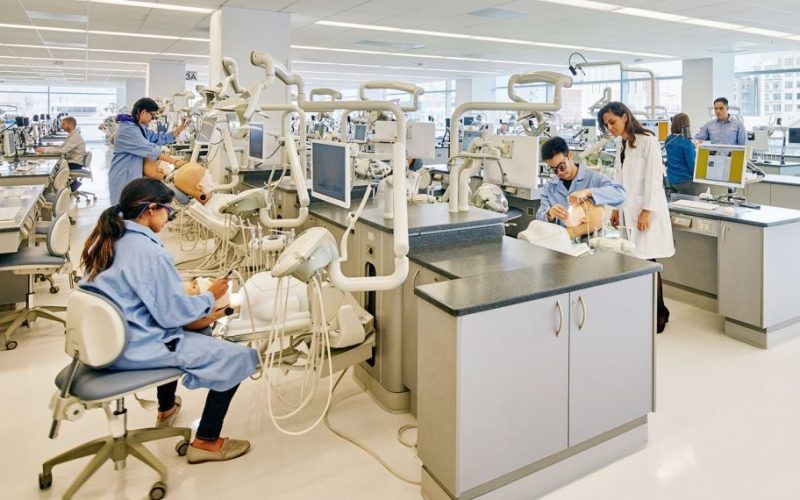Have you ever watched a medical drama and been totally fascinated by the lab technicians examining mysterious samples under microscopes? Well, those technicians are actually pathologists, and they play a super important role in the medical world! Pathology is basically like medical detective work – figuring out what’s going on inside a patient by examining tissues and cells.
So, if you’re curious about the microscopic world and how it affects our health, then pathology might be your dream career! But before you grab your magnifying glass, you’ll need to attend a college with a great pathology program. That’s where our list of the best Pathology schools comes in.
This article is here to be your guide to finding the perfect college for pathology in 2024! We’ll explore some of the top colleges that will equip you with the knowledge and skills you need to become a rockstar pathologist.
Table of contents
- Why Study Pathology?
- How many years does it take to study pathology?
- Best Pathology Colleges
- #1. Harvard Medical School (Boston, MA)
- #2. Johns Hopkins University School of Medicine (Baltimore, MD)
- #3. Stanford University School of Medicine
- #4. University of California, San Francisco (UCSF)
- #5. Mayo Clinic School of Medicine
- #6. The University of Pennsylvania Perelman School of Medicine
- #7. Washington University School of Medicine
- #8. University of Michigan
- #9. University of Wisconsin – Madison
- #10. University of Washington School of Medicine (Seattle, WA)
- #11. Columbia University
- #12. University of Texas Southwestern Medical Center (Dallas, TX)
- #13. The University of Pittsburgh School of Medicine
- #14. University of California, San Diego
- #15. Duke University
- #16. University of North Carolina School of Medicine (Chapel Hill, NC)
- #17. University of Chicago
- Conclusion
- References
- Recommendations
Why Study Pathology?
Studying pathology offers a multitude of compelling reasons for those interested in the medical field. Pathology, often called the “science of disease,” is a fascinating and essential discipline that plays a crucial role in healthcare.
Here are some compelling reasons studying pathology can be a rewarding and fulfilling choice:
- Vital Contribution to Patient Care: Pathologists are integral healthcare team members, working alongside clinicians to provide critical diagnostic information. Through examining tissue samples, blood, and other bodily fluids, pathologists help identify diseases, determine their stage and severity, and guide treatment decisions.
- Broad Scope of Specialization: Pathology offers a wide range of specialized areas to focus on, catering to diverse interests and career paths. Anatomical pathology involves the study of tissue specimens and plays a crucial role in diagnosing cancer and other diseases.
- Integration of Science and Medicine: Pathology bridges the gap between basic science research and clinical medicine. It combines anatomy, physiology, microbiology, genetics, and immunology to understand diseases at the cellular and molecular levels.
- Versatile Career Opportunities: A pathology education opens doors to many career opportunities. Graduates can pursue careers as practicing pathologists in hospitals, laboratories, or private practice.
- Global Impact: Pathology has a global impact on public health. By understanding the distribution, causes, and effects of diseases, pathologists contribute to disease surveillance, outbreak control, and preventive strategies.
Also, read: Psychology and Sociology Majors: What’s the Difference & Similarities?
How many years does it take to study pathology?
Becoming a pathologist is a lengthy but rewarding journey that requires significant education and training. Here’s a breakdown of the typical timeline:
- Undergraduate studies (4 years): This forms the foundation, where you’ll take general science courses like biology, chemistry, and physics. You might also take specific courses relevant to pathology, like anatomy and physiology.
- Medical School (4 years): After your bachelor’s degree, you’ll need to attend medical school. Here, you’ll delve deeper into medical sciences, learn about diseases, and gain clinical skills.
- Residency (4 years): Following medical school, you’ll enter a pathology residency program. This residency focuses on the practical aspects of pathology, including performing autopsies, analyzing tissues and fluids under microscopes, and learning to diagnose diseases based on these examinations.
So, in total, it typically takes 12 years (4 + 4 + 4) of dedicated education and training to become a pathologist. The extensive training ensures pathologists have the strong scientific background and specialized skills necessary to play a crucial role in diagnosing and treating diseases.
Best Pathology Colleges
Let’s continue our journey through the 17 best pathology schools in 2024 and explore what each institution offers. Remember, these colleges have been selected based on their academic excellence, faculty expertise, research opportunities, and state-of-the-art facilities.
#1. Harvard Medical School (Boston, MA)
As one of the leading pathology schools, Harvard Medical School boasts a world-class pathology program. With access to renowned hospitals and research facilities, students here receive exceptional training in pathology and clinical and research aspects.
#2. Johns Hopkins University School of Medicine (Baltimore, MD)
Known for its groundbreaking research and exceptional faculty, Johns Hopkins University School of Medicine offers an outstanding pathology program.
Students benefit from collaborations with the renowned Johns Hopkins Hospital, allowing them to gain hands-on experience in diverse clinical settings.
#3. Stanford University School of Medicine
Stanford University, School of Medicine, combines innovative technology, interdisciplinary research opportunities, and a strong emphasis on personalized medicine.
With state-of-the-art facilities and a collaborative learning environment, students here receive comprehensive training in pathology.
#4. University of California, San Francisco (UCSF)
UCSF School of Medicine is renowned for its expertise in translational medicine and innovative research. The pathology program here offers a rigorous curriculum, clinical exposure, and opportunities to work alongside leading experts in the field.
#5. Mayo Clinic School of Medicine
The Mayo Clinic School of Medicine prides itself on its patient-centered approach and integrated clinical practice. Students benefit from extensive hands-on experience, exposure to various pathology specialties, and collaboration with world-renowned physicians.
Also, read: Is Medicine Career a STEM Degree?
#6. The University of Pennsylvania Perelman School of Medicine
With a rich history and commitment to innovation, the University of the Pennsylvania Perelman School of Medicine is another great pathology school for delivering top-notch programs.
It offers a comprehensive pathology program. Students have access to innovative research facilities, esteemed faculty, and a wide range of clinical experiences.
#7. Washington University School of Medicine
Washington University School of Medicine in St. Louis is known for its strong research focus and collaborative atmosphere.
The pathology program here emphasizes a multidisciplinary approach, allowing students to explore various subspecialties and engage in groundbreaking research.
#8. University of Michigan
For students who want to earn a degree in experimental pathology or pathology, the University of Michigan at Ann Arbor is an excellent option. U-M is a public institution with a large student body that can be found in Ann Arbor, a mid-sized city.
#9. University of Wisconsin – Madison
The University of Wisconsin’s Pathology Program, offered through the School of Medicine and Public Health, is highly regarded for its comprehensive training and innovative research opportunities.
Students gain a solid foundation in basic sciences while delving into specialized topics such as histopathology, molecular pathology, and hematopathology.
Students have access to the state-of-the-art University of Wisconsin Hospital and Clinics, which offers a diverse patient population and a broad range of clinical cases.
#10. University of Washington School of Medicine (Seattle, WA)
The University of Washington, School of Medicine, excels in its pathology program, offering a strong foundation in both anatomical and clinical pathology.
With access to leading-edge research facilities and collaborative projects, students receive comprehensive training in the field.
Read: Best Small Town Colleges
#11. Columbia University
Columbia University ranks as one of the best pathology schools in the world. Its pathology program is known for its strong research and clinical training emphasis. With access to renowned medical centers in New York City, students can learn from experts in the field and engage in innovative research projects.
#12. University of Texas Southwestern Medical Center (Dallas, TX)
The University of Texas Southwestern Medical Center boasts a robust pathology program emphasizing hands-on training and research.
Students can work alongside world-renowned faculty, gain exposure to diverse patient populations, and collaborate on groundbreaking research projects.
#13. The University of Pittsburgh School of Medicine
The University of the Pittsburgh School of Medicine has a top-notch pathology program focusing on innovative research and clinical practice. With access to leading research centers and medical facilities, students receive comprehensive training in all aspects of pathology.
#14. University of California, San Diego
On the list of pathology schools is the University of California. The UCSD School of Medicine offers a comprehensive pathology program that combines clinical practice, research, and innovative technology.
With a focus on molecular pathology and genomics, students here receive training at leading research institutes and medical centers.
#15. Duke University
Duke University School of Medicine offers a rigorous pathology program emphasizing clinical practice and research. Students benefit from collaborations with Duke University Hospital and engage in interdisciplinary research initiatives.
#16. University of North Carolina School of Medicine (Chapel Hill, NC)
The exceptional pathology program at the University of North Carolina School of Medicine combines clinical training, research opportunities, and a solid foundation in the basic sciences. Modern facilities and a supportive learning environment benefit students here.
Hence, this is one of the pathology schools you should consider when making your list of schools to attend.
Also, read: 10 Best Colleges for Pediatric Nurses
#17. University of Chicago
The University of Chicago Pritzker School of Medicine offers a robust pathology program integrating clinical practice, research, and education. Students benefit from state-of-the-art facilities, close collaboration with renowned faculty, and exposure to diverse patient populations.
FAQs – Best Pathology Colleges
Choosing the best pathology school depends on various factors. Consider factors such as the school’s curriculum, areas of specialization, faculty expertise, research opportunities, available resources and facilities, geographic location, and the overall learning environment.
Many top pathology schools offer scholarships, grants, and financial aid options to support students’ education.
Graduates from the best pathology schools have a wide range of career prospects. They can work as practicing pathologists in hospitals, private laboratories, or academic institutions. Some may choose to specialize further by pursuing fellowship programs in specific pathology subspecialties, such as surgical pathology, cytopathology, or hematopathology.
Conclusion
Each of these colleges has its distinct strengths and offerings to provide students with a solid foundation in pathology and prepare them for successful careers in the field. Whether you’re keen on symptomatic pathology, legal pathology, or exploration arranged pursuits, these establishments give the fundamental assets and chances to succeed.
Remember that choosing the right college is an individual choice based on your preferences, objectives, and interests. To make an informed decision that aligns with your goals, we urge you to investigate these institutions further by visiting their websites, contacting former students or alumni, and gathering as much information as possible.
I wish you the best of luck as you work toward becoming a pathologist, and I hope you will find the ideal college to help you succeed!
References
- Edurank.org – Best Universities for Pathology in the World
- Collegefactual.com – Pathology/Experimental Pathology




